人教版高中英语必修一Unit2Englisharoundtheworld整个单元课件
- 格式:pptx
- 大小:834.00 KB
- 文档页数:112
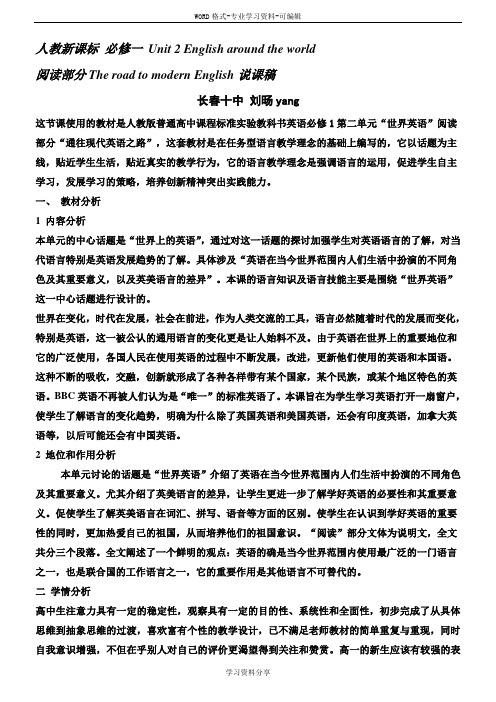
人教新课标必修一Unit 2 English around the world阅读部分The road to modern English说课稿长春十中刘旸yang这节课使用的教材是人教版普通高中课程标准实验教科书英语必修1第二单元“世界英语”阅读部分“通往现代英语之路”,这套教材是在任务型语言教学理念的基础上编写的,它以话题为主线,贴近学生生活,贴近真实的教学行为,它的语言教学理念是强调语言的运用,促进学生自主学习,发展学习的策略,培养创新精神突出实践能力。
一、教材分析1 内容分析本单元的中心话题是“世界上的英语”,通过对这一话题的探讨加强学生对英语语言的了解,对当代语言特别是英语发展趋势的了解。
具体涉及“英语在当今世界范围内人们生活中扮演的不同角色及其重要意义,以及英美语言的差异”。
本课的语言知识及语言技能主要是围绕“世界英语”这一中心话题进行设计的。
世界在变化,时代在发展,社会在前进,作为人类交流的工具,语言必然随着时代的发展而变化,特别是英语,这一被公认的通用语言的变化更是让人始料不及。
由于英语在世界上的重要地位和它的广泛使用,各国人民在使用英语的过程中不断发展,改进,更新他们使用的英语和本国语。
这种不断的吸收,交融,创新就形成了各种各样带有某个国家,某个民族,或某个地区特色的英语。
BBC英语不再被人们认为是“唯一”的标准英语了。
本课旨在为学生学习英语打开一扇窗户,使学生了解语言的变化趋势,明确为什么除了英国英语和美国英语,还会有印度英语,加拿大英语等,以后可能还会有中国英语。
2 地位和作用分析本单元讨论的话题是“世界英语”介绍了英语在当今世界范围内人们生活中扮演的不同角色及其重要意义。
尤其介绍了英美语言的差异,让学生更进一步了解学好英语的必要性和其重要意义。
促使学生了解英美语言在词汇、拼写、语音等方面的区别。
使学生在认识到学好英语的重要性的同时,更加热爱自己的祖国,从而培养他们的祖国意识。
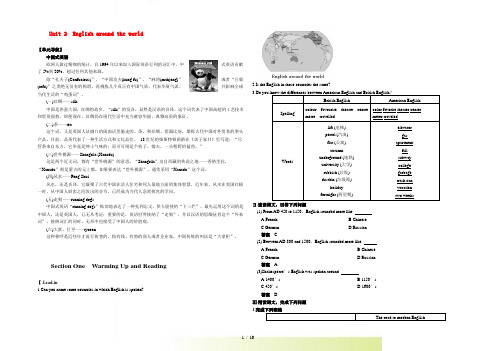
Unit 2 English around the world【单元导航】中国式英语欧洲人做过精细的统计,自1994年以来加入国际英语行列的词汇中,中式英语贡献了5%到20%,超过任何其他来源。
除“孔夫子(Confucious)”、“中国功夫(kung fu)”、“麻将(mahjong)”或者“豆腐(tofu)”之类绝无仅有的称谓,再挑拣几个真正有中国气质、代表华夏气派、并影响全球当代生活的“鸡蛋词”。
(一)丝绸——silk中国是养蚕大国,丝绸的故乡。
“silk”的发音,显然是汉语的音译,这个词代表了中国高超的工艺技术和贸易强势。
即便现在,丝绸仍在现代生活中充当雍容华丽、典雅高贵的象征。
(二)茶——tea这个词,又是英国人从拗口的闽南话里偷走的。
茶,和丝绸、瓷器比肩,堪称古代中国对外贸易的拳头产品。
目前,品茶代表了一种生活方式和文化品位。
18世纪的柴斯特顿勋爵在《训子家书》里写道:“尽管茶来自东方,它毕竟是绅士气味的;而可可则是个痞子、懦夫,一头粗野的猛兽。
”(三)世外桃源——Shangrila (Xanadu)这是两个近义词,都有“世外桃源”的意思。
“Shangrila”出自西藏的传说之地——香格里拉,“Xanadu”则是蒙古的元上都。
如果要表达“世外桃源”,通常采用“Xanadu”这个词。
(四)风水——Feng Shui风水,还是音译。
它凝聚了古代中国在活人住宅和死人墓地方面的集体智慧。
近年来,风水在美国红极一时,从中国人唇齿之间发出的音节,已经成为当代人急需探究的学问。
(五)走狗——running dogs中国式英语“running dogs”贴切地表达了一种见利忘义、供人驱使的“下三烂”。
最先运用这个词的是中国人,还是英国人,已无从考证;重要的是,英语世界接纳了“走狗”,并以汉语的思维抚育这个“外来词”。
接纳词汇的同时,无形中也接受了中国人的价值观。
(六)大款、巨亨——tycoon这种称呼是近些年才流行街巷的,指有钱、有势的商人或者企业家,中国传统的叫法是“大掌柜”。
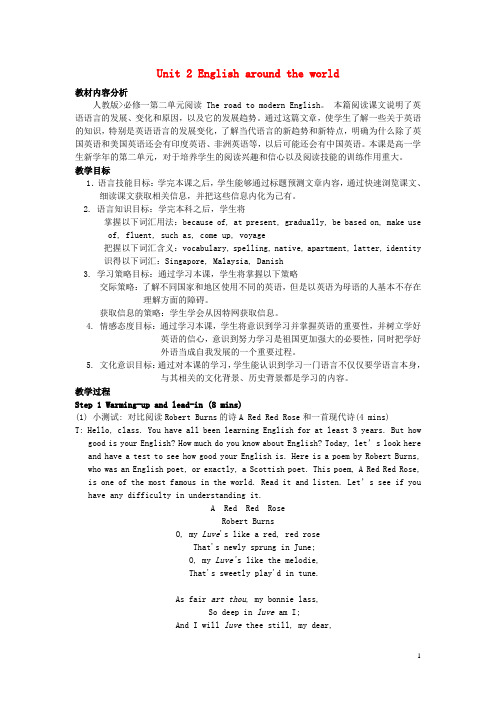
Unit 2 English around the world教材内容分析人教版>必修一第二单元阅读The road to modern English。
本篇阅读课文说明了英语语言的发展、变化和原因,以及它的发展趋势。
通过这篇文章,使学生了解一些关于英语的知识,特别是英语语言的发展变化,了解当代语言的新趋势和新特点,明确为什么除了英国英语和美国英语还会有印度英语、非洲英语等,以后可能还会有中国英语。
本课是高一学生新学年的第二单元,对于培养学生的阅读兴趣和信心以及阅读技能的训练作用重大。
教学目标1.语言技能目标:学完本课之后,学生能够通过标题预测文章内容,通过快速浏览课文、细读课文获取相关信息,并把这些信息内化为己有。
2. 语言知识目标:学完本科之后,学生将掌握以下词汇用法:because of, at present, gradually, be based on, make use of, fluent, such as, come up, voyage把握以下词汇含义:vocabulary, spelling, native, apartment, latter, identity 识得以下词汇:Singapore, Malaysia, Danish3. 学习策略目标:通过学习本课,学生将掌握以下策略交际策略:了解不同国家和地区使用不同的英语,但是以英语为母语的人基本不存在理解方面的障碍。
获取信息的策略:学生学会从因特网获取信息。
4. 情感态度目标:通过学习本课,学生将意识到学习并掌握英语的重要性,并树立学好英语的信心,意识到努力学习是祖国更加强大的必要性,同时把学好外语当成自我发展的一个重要过程。
5. 文化意识目标:通过对本课的学习,学生能认识到学习一门语言不仅仅要学语言本身,与其相关的文化背景、历史背景都是学习的内容。
教学过程Step 1 Warming-up and lead-in (8 mins)(1) 小测试: 对比阅读Robert Burns的诗A Red Red Rose和一首现代诗(4 mins)T: Hello, class. You have all been learning English for at least 3 years. But how good is your English? How much do you know about English? Today, let’s look here and have a test to see how good your English is. Here is a poem by Robert Burns, who was an English poet, or exactly, a Scottish poet. This poem, A Red Red Rose, is one of the most famous in the world. Read it and listen. Let’s see if you have any difficulty in understanding it.A Red Red RoseRobert BurnsO, my Luve's like a red, red roseThat's newly sprung in June;O, my Luve's like the melodie,That's sweetly play'd in tune.As fair art thou, my bonnie lass,So deep in luve am I;And I will luve thee still, my dear,Till a' the seas gang dry.Till a' the seas gang dry, my dear,And the rocks melt wi' the sun;I will luve thee still, my dear,While the sands o' life shall run.And fare thee well, my only Luve!And fare thee well, a while!And I will come again, my Luve,Tho' it were ten thousand mile!T: Did you find it easy or difficult? What about this one? This poem was written by a modern writer.I Am Not YoursI am not yours, not lost in you,Not lost, although I long to beLost as a candle lit at noon,Lost as a snowflake in the sea.You love me, and I find you stillA spirit beautiful and bright,Yet I am I, who long to beLost as a light is lost in light.Oh plunge me deep in love—put outMy senses, leave me deaf and blind,Swept by the tempest of your love,A taper in a rushing wind.T: Why is the first poem difficult to understand while the second one not? (Mainly because of some of the words used in the first poem, which are not often used now. Robert Burns lived in the 18th century while the writer of the second poem is a modern poet.) So we can see people in the past used different words from what is used today.(2) 听一段一位学生和来自澳大利亚的外教的对话(4 mins)T: Now, when one day Qiu Zhensong met our foreign teacher Zak, who is from Australia, what happened? Let’s welcome Zak and Qiu Zhensong.(After the dialogue, the foreign teacher explained.) Did you understand our dialogue? (Ss: No.) What’s the difficulty? (Different words were used in Australia which you do not know in American or British English.) T: So from the two poems and the dialogue we can see people from different countries speak different English and people in different times also use different English. How did the difference come about?[意图说明] 引入话题:不同时代、不同国家所使用的英语有所不同。
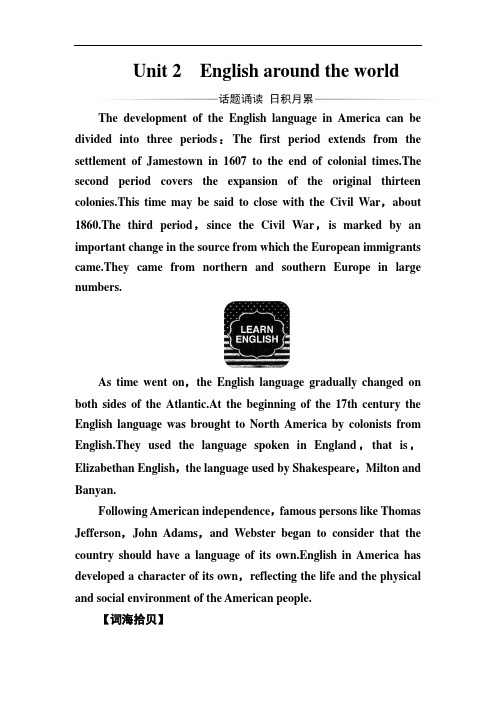
Unit 2English around the worldThe development of the English language in America can be divided into three periods:The first period extends from the settlement of Jamestown in 1607 to the end of colonial times.The second period covers the expansion of the original thirteen colonies.This time may be said to close with the Civil War,about 1860.The third period,since the Civil War,is marked by an important change in the source from which the European immigrants came.They came from northern and southern Europe in large numbers.As time went on,the English language gradually changed on both sides of the Atlantic.At the beginning of the 17th century the English language was brought to North America by colonists from English.They used the language spoken in England,that is,Elizabethan English,the language used by Shakespeare,Milton and Banyan.Following American independence,famous persons like Thomas Jefferson,John Adams,and Webster began to consider that the country should have a language of its own.English in America has developed a character of its own,reflecting the life and the physical and social environment of the American people.【词海拾贝】1.colonial adj.殖民的2.expansion n.扩张3.immigrant n.移民【问题思考】True (T)or False (F):1.The development of the English language in America can be divided into four periods.()2.At the beginning of the 17th century the English language was brought to South America.()答案:1.F 2.FⅠ.重点单词分类记★拼写高频单词1.________adj.官方的;正式的;公务的2.________adj.本国的;本地的n.本地人;本国人3.________n.词汇;词汇量;词表4.________n.&v t.命令;指令;掌握5.________n.&v t.请求;要求6.________ad v.直接;挺直adj.直的;笔直的;正直的7.________n.街区;块;木块;石块答案:1.official 2.native 3.vocabulary mand 5.request 6.straight7.block★联想拓展单词1.________v t.以……为根据n.基部;基地;基础→________adj.基本的;基础的2.________adj.逐渐的;逐步的→________ad v.逐渐地;逐步地3.________adj.较后的;后半的;(两者中)后者的→______adj.最近的;最新的→________adj.后期的________ad v.近来;最近4.________n.本身;本体;身份→________v t.&v i.认出;鉴定5.________adj.流利的;流畅的→________ad v.流利地;流畅地→________n.流利;流畅6.________adj.频繁的;常见的→________ad v.常常;频繁地7.________v t.表达;表示→________n.词语;表示;表达8.________v t.辨认出;承认;公认→________n.认出;承认9.________adj.现实的;实际的→________ad v.实际上;事实上10.________n.使用;用法;词语惯用法→________v t.使用→________adj.有用的→________adj.无用的答案:1.base basic 2.gradual gradually tter latest later lately 4.identity identify 5.fluent fluently fluency 6.frequent frequently7.express expression 8.recognize recognition9.actual actually 10.usage use useful useless ★识记阅读单词1.elevator n.________________2.voyage n. ________________3.apartment n. ________________4.enrich v t. ________________5.spelling n. ________________6.identity n. ________________7.accent n. ________________8.lightning n. ________________9.cab n. ________________答案:1.电梯;升降机 2.航行,航海 3.〈美〉公寓住宅;单元住宅 4.使富裕;充实;改善 5.拼写;拼法6.本身;本体;身份7.口音;腔调;重音8.闪电9.出租车Ⅱ.重点短语快速记1.________________超过;非常;不仅是2.________________走近;上来;提出3.________________以……为基础4.________________信不信由你5.________________扮演一个角色;参与6.________________因为;由于7.________________……的数量8.________________现在;目前9.________________利用;使用10.________________例如……;像这种的答案:1.more than e up 3.be based on 4.believe it or not 5.play a part(in) 6.because of7.the number of8.at present 9.make use of10.such asⅢ.经典句式应用记1.Native English speakers can understand each other ________________________(尽管他们所讲的英语不尽相同).(even if/though引导让步状语从句)2.Believe it or not,there is____________________(没有什么标准英语).(no such...as...没有像……这样的)3.____________________(这是因为)in the early days of radio,those who reported the news were expected to speak excellent English.(because引导表语从句)4.However,on TV and the radio you will hear differences ____________(人们说话的方式).(the way+定语从句)答案:1.even if they don't speak the same kind of English 2.no such thing as standard English 3.This is because 4.in the way people speakⅠ.Skimming for the main information1.What does the passage tell us?A.The brief history of the English language.B.The modern English based more on German.C.The old English based more on French.D.English spoken in English.答案:A2.Find out the main idea of each paragraph.Para.1________A.The example of the difference between different native English speakers.Para.2________B.Wide use of English.Para.3________C.English is a language spoken all around the world.Para.4________D.Why English has changed over time.Para.5________E.English was settled.答案:Para.1—B Para.2—A Para.3—D Para.4—E Para.5—CⅡ.Scanning for detailed information1.Why did the people in many other countries besides England begin to speak English in the 17th century?A.Because they wanted to trade with English people.B.Because people from England made voyages to conquer other parts of the world.C.Because they found English easier to speak.D.Because they wanted to conquer England.2.Which of the following words is American English?A.Flat.B.Apartment.C.Honour. D.Metre.3.When did two big changes in English spelling happen?A.In the 16th century. B.In 1150.C.In the 19th century. D.In the 20th century.4.From the text,we know________.A.only English changed over timeB.all languages will change when cultures meetC.all English words were from FrenchD.fewer and fewer Chinese people are learning English5.Why do more people speak English?A.Because it is an international language.B.Because it has the largest number of speakers.C.Because it is easy to learn.D.Because it always stays the same.答案:1.B 2.B 3.C 4.B 5.AⅢ.Intensive reading to finish the passageEnglish has changed and 1.________(develop) when culturesmeet and communicate 2.________each other.From AD 450 to 1150,new settlers to England 3.________(rich) the English language and enlarged its vocabulary.In 1620,British people began to move to 4.________countries,and gradually,English 5.________(speak)in many other countries.By the 19th century American English spelling got a separate identity 6.________Noah Webster wrote his dictionary.At 7.________,more people speak English as their first,8.________or a foreign language than ever before.People in South Asia 9.________as India,Singapore speak fluent English.China may have the 10.________(large) number of English learners.答案:1.developed 2.with 3.enriched 4.other5.was spoken 6.when7.present8.second9.rgestⅣ.Analyze the following difficult sentences in the text1.At first the English spoken in England between about AD 450 and 1150 was very different from the English spoken today.[句式分析]此句为复杂的简单句。
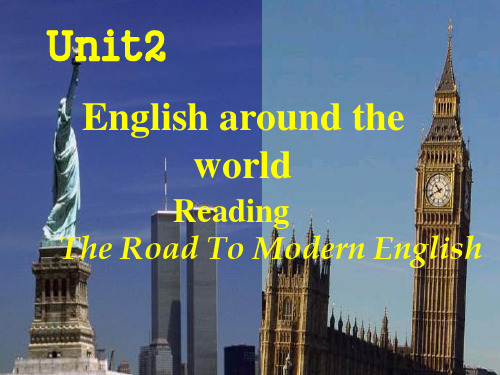
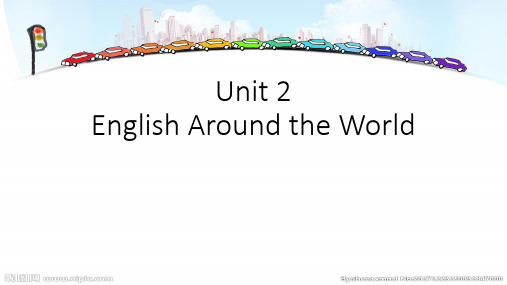
Unit 2 English around the worldThe First Period●从容说课This is the first period of this unit.This period focuses on reading.In this lesson,there are a warming up and a passage of reading “The Road To Modern English”.This warming up attracts students’ attention to the phenomenon of world English.The reading passage tells us the present situation in which English is used and the deve lopment of English.To let students to form a good habit of reading and have proper reading strategies are one of the main tasks for senior middle school English teaching,so in this period,we should teach according to this aim.In this lesson,students will have a general idea of the conception of world English by guessing some words on American English and Britain English.To arouse students’ interest,I’ll present them some typical funny stories about different kinds of English.This is to get the students ready for the reading part.Before reading the passage,students should first get familiar with the new words in the text to remove the barrier in reading.Then students are asked to guess what the text will tell us.This step is designed to train students ability to predict the content of a passage according the title.The next step is to ask students to have a general idea of the structure of the text with the purpose of improving the skill of skimming.After that,detailed reading follows.In the step,students will be asked to deal with the passage paragraph by paragraph in which they will have different tasks to finish such as true-or-false exercise,filling a form with information in the text and retelling.This step trains students’scanning skill and conclusion skill.The last step for students is to discuss the topic “It is not necessary for we Chinese to learn English since we have our own elegant language”.This is to train students to read critically.Besides,it can arouse students’ interest in learning English.●三维目标1.Knowledge:Master the words and phrases and get a view of the road to modern English.2.Ability:Train students’ reading skill.3.Emotion:Let students know more about English and inspire students to study English hard.●教学重点The understanding and comprehension of the passage.●教学难点(1)How to get to master the useful words and expressions.(2)How to improve students’ ability to read an article.●教具准备cassette recorder,some pieces of slide●教学过程Step 1 GreetingsT:Good morning,boys and girls!S:Good morning,teacher!Step 2 Warming upT:English is a widely used language.Do you know in which countries English is spoken as their native language?S a:The US,the UK,Australia,Canada...T:(a slide:Nancy:Oh,there you are.Now then,did you have a good flight?Joe:Sure,we flew all the way direct from Seattle to London.Nancy:You must be very tired.Did you sleep at all on the plane?Joe:No,not really.I’m very tired.Could I use your bathroom?Nancy:Why,of course.You don’t need to ask,just make yourself at home.Let me give you a clean towel.Joe:A towel?Nancy:Yes.Here you are.The bathroom is upstairs.It’s the second door on the left.(After a while)Nancy:Have you found it?Joe:Well,eh,yes,I mean no.I mean,I found the bathroom,but I didn’t find what I was looking for!)Here is a short dialogue.Read it and discuss with your partner:What is it that Joe can’t find in the bathroom?Why can’t he find it?S b:It is the toilet.T:And why?S c:Perhaps when Joe says “bathroom”,he means a place,where there is a toilet.But in Nancy’s eyes,it is a place where people can only have a bath.T:You are right.Do you know why there’s a misunderstanding between them?S d:Because they sp eak different kinds of English.T:Great.There’s more than one kind of English in the world.In some important ways they’re different.They’re called world English.Can you guess what they include?S e:Canadian,British,American,Australian and Indian English.T:Right.So you know even two native speakers of English may still not speak the same kind of English.Look at the examples on P9.Now try to guess which of the following words are British English and which are American English.Suggested answers:Am.English:mom;on a team;rubber;gasBr.English:mum;in a team;eraser;petrolStep 3 New WordsT:From today on,we’ll learn something about English around the world.First of all,let’s get familiar with the new words.Yesterday I asked you to read the new words and look up the meaning of them.Now let’s have a game in which one of you tells us the meaning or the explanation of the words and the others guess which word it is.Let’s go!Suggested explanation:1.include:have something or somebody as one of a group.e.g.:The tour included a visit to the Science Museum.2.play a role in:have a part in3.international:connected with two or more countries4.native:(1)connected with the place where you have always lived or have lived for a long time(2)a person who lives in a particular place,especially sb. who has lived there a long time5.elevator:lift6.flat:(1)having a smooth surface (2)(Br. E)a set of rooms for living in7.apartment:(Am. E)a set of rooms for living in8.modern:of the present time or recent timee up:to move toward10.culture:the customs and beliefs,art,way of life and social organization of a particular country or group11.actually:really;in fact12.present:(1)existing or happening now (2)being in a particular place13.rule:control14.vocabulary:all the phrases and phrases you learnage:the way in which words are used in a language16.identity:who or what sb./sth. isernment:the group of people who are responsible for controlling a country or a state18.rapidly:fastT:That’s great!You’ve made a good preparation.Now please read the words together.(show words and explanations on the slide)Step 4 Pre-readingT:Just now,we’ve known that there’re many kinds of English in the world.Then why are there so many kinds?Ss:We don’t know.T:Anyway,we’ll find out the cause today.Now read the title of the passage “the road to modern English”.What do you think it will tell us?S f:I guess it will tell us the development of English.Step 5 SkimmingT:Now let’s find out whether your answer is right.So please read the passage fast in silence and find out the main idea of each paragraph.Suggested answer:Para.1:Brief introduction of the change in English.Para.2:An example of different kinds of English.Para.3:The development of English.Para.4:English spoken in some other countries.Step 6 ScanningT:You’ve mastered the structure of the passage.Now please read para.1 and 2 loud in detail.T:(several minutes later)Have you finished?Here’re some statements of which some are right while some not.Read them and then tell whether they are true or false.If false,please find out the mistake and correct it.(slides:1.Most of the English speakers in the 16th century lived in England.2.More and more people use English as their first or 2nd language.3.The US has the largest number of English speakers.4.Native English speakers can understand everything because they speak the same kind ofEnglish.)S g:The first one is true.S h:The second one is true.S i:The third one is false.China has the largest number of English speakers.S j:The fourth one is false.Native English speakers may not be able to understand everything because they do not speak the same kind of English.T:You did a very good job.Now please read para.3 after the tape.And then fill in the formThe Road To Modern EnglishThe cause:Cultures communicate with one anotherTime Things that happenedBetween AD 450and 1150Based on German1150 to 1500 Less like German;more like French→why?→because Frenchmen ruled England thenIn the 1600’s Shakespeare broadened the vocabulary.A big change in English,giving its own identity→why?→caused by “American Dictionary of the English language”written by Noah WebsterLater British people brought English to AustraliaT:We know culture communication brings about changes in English.Can you think of any effect that Chinese has on English?S k:In English there are some Chinese words such as gongfu,long time no see,...T:Great!With more closely communication of culture,English is changing more frequently.T:As we all know,English is spoken as the native language mostly in western countries.Then what about English in some other parts of the world?After reading the last paragraph,would you please say something about the present situation of English in your own words?S l:It is also spoken as a foreign or 2nd language in many other countries.For example,in India,it is used for government and education.In some African and Asian countries,it is also spoken,such as in South Africa,Singapore and Malaysia.While in China,the number of English speakers is increasing fast.T:Quite good.Step 7 DiscussionT:So far,we’ve known that English is becoming more and more important in China.It has been an important subject for Chinese students.But someone say that Chinese is a much more elegant language.So it is more important for us to master it and it is not so necessary for us to master a foreign language.Do you agree with this opinion and why?Suggested answer:I don’t agree with it.With the cultural communication becoming more and more frequent,the chance to contact foreigners,exported goods,international conferences,and so on,is more and more.As the most widely used language,English is regarded as the language used in most international situations.Thus,if we want to keep up with the times,we’d better master English and use it as a tool.Step 8 Summary and homeworkT:Today we’ve learned an article on “the road to modern English”.After class,you shouldread it again and again to get the idea of the text further.Do the exercises of comprehending and try to tell your partner something about English in our own words.That’s all for today.Class is over.●板书设计Unit 2 English around the worldThe First PeriodNew words:Main idea of each para-graph:... ...... ...●活动与探究This activity is to make research into differences between different kinds of world English and some words from other languages in English.Differences Pronunciation Spelling MeaningUsage...Words from other languages Chinese Japanese French Spanish German...●备课资料Soon There Will Be No Such Thing As “Wrong”English In this article:Senior Indian journalist Gautaman Bhaskaran says that English is so flexible that one day there will be too many variations around the world.English is a victim of its own success.The other day The Times in London displayed a cartoon showing an excited schoolboy flaunting his test scores:“I done good in English.”Days later,editors of the Oxford Dictionary of English rued the spread of what they termed “greengrocer’s English”.Grammar and syntax,they regretted,were going out of fashion.Others in England—in the Oxf ord University Press,the BBC and so on—said the incorrect use of cliches were marring the smooth flow of a great language whose ability to imbibe and absorb has been one important reason for its success.This success also stems from the language’s unique position of being the only one spoken in most parts of the world.Really,English has no boundaries.Even in countries such as Japan and China,which were not colonized by Britain,English is making a determined “conquest”.Unfortunately,such a conquest is not always welcome because a language sometimes doubles as a political weapon.At some point it ceases to be just a means of communication and English is a classic example of this.It has always led a troubled life.It has been disliked,even hated,largely because the people who originally spoke English conquered,colonized and terrorized half the world,or just about.The animosity to the language continues,at least in some places.The bitterness that the French,for instance,have for English is a g ood example of a language being giving a quasi-political role in society.Fortunately,this aversion does not run as it did some years ago,and there is a growing realization that English is the lingua franca.China and Japan,among a host of other nations,have been making serious efforts to promote the language.Some months ago there was a hue and cry in Singapore over the spread of “terrible English”which the authorities called “Singlish”.“Down with it!”they said,and urged Singaporeans to learn correct English,the phenomenal flexibility of which has often made things difficult for those who have to use it every day.Today even university graduates find it hard to pen a couple of correct sentences in it.More horrifying is that many teachers and university vice-chancellors speak and write poor and ungrammatical English.Often,they are found to be out of touch with what is called “usage”and,as we all know,this is one of the pillars the language rests on.Yet,despite the mess that English is in India,the nation has—more than two centuries after Samuel Johnson wrote his English dictionary—become the hottest destination for top lexicographers.The new 10th revised edition of the Oxford Concise English Dictionary includes hundreds of Indian words.Leading the list of 600 Indian English entries are “Hindutva”(Hindu identity),“dada”(older brother),“panchayat”(local administration),“chai”(tea),“pani”(water),“puri”(a dish made of wheat)and “dosa”(rice pancake).In fact,Indian words from 20 per cent of entries and rank as the third-largest component after American and Australian English segments.Other former British colonies such as New Zealand,South Africa and the Caribbean islands follow the Indian English collection of words.English,despite its hiccups,is endearing to the common Indian man or woman.About 150 years after Lord Macaulay introduced the language in India to create “babus”(clerks)for the British bureaucracy,70 million Indians speak English,a number that is higher than that in Britain.However,there is a sneaking fear among Puritans that with this kind of sp read,English may stop being English.While the French have fanatically preserved the purity of their language,the English have liberally allowed other influences to affect their lingo.So,what is seen as its strength —the fact that people all over the world understand it—can be an undermining obstacle.There might be a serious problem if every state or continent were to have its own version of English.As one writer said:“There is a risk in relentless atomization.”With too many variations of the language,a time may come when one group of English-speaking people may not be able to understand another.This is happening.Hear the way Singaporeans speak English.Listen to the Australians pronouncing “e”;it sounds like “a”.A few of the films made lately by British directors Ken Loach and Mike Leigh had to have subtitles in English.Accents in the north of Britain can be hard for people in the south to understand,let alone those outside the island.The point is,no language must be allowed such flexibility—anything goes in the name of functional communication—that people begin to take liberties with it.Ultimately,there may be no such thing as wrong English.The schoolboy in the Times cartoon was doing just that.He knew nobody would scold him for getting his English wrong.不久以后就没有“错误的”英语这一说了英语成了自身成功的牺牲品,前几天,伦敦的《泰晤士报》刊登了一幅漫画,上面画了一个兴高采烈的男学生炫耀他的考试成绩:“I done good in English”(我的英语成绩不错)。